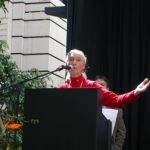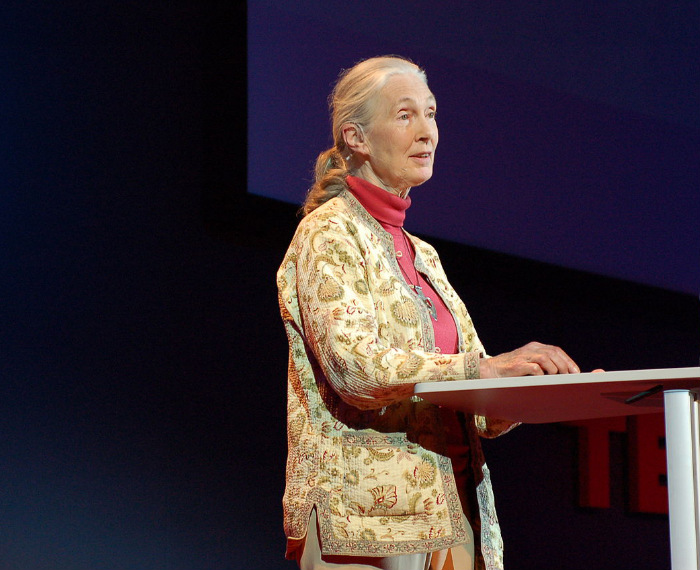Amy Edelstein interviews Dr. Jane Goodall
Dr. Jane Goodall, primate specialist, UN Ambassador for Peace, and special advisor to UN Secretary General Kofi Annan, seemed to be everywhere at the World Summit for Sustainable Development, ever patient and stridently impatient. She glided from event to event, observing with a scientist’s eye, responding with a mystic’s heart, and synthesizing with an alchemist’s mind, always transmitting a message of optimistic urgency in the face of the threats to our natural world.
Her first afternoon at the Summit, Goodall accompanied Secretary General Annan to Sterkfontein Caves, the “Cradle of Humankind” where the oldest fossil records of our ancestors have been found. As they walked through the living bowels of the earth, under organ pipe stalactites, past chilly subterranean pools, their informal briefing about our evolutionary crisis was watched over by silent eyes of our ancestors of the last 2.5 million years.
 Jane’s own eyes are sky blue, the color of an alpine lake, as crisp and as clear. And when she speaks to you, she looks straight into you, as if trying to connect beyond the words and structures that define us as human beings and commune with some fundamental essence of species life. Her gaze is uncanny, slightly unnerving, the steady beam of a scientific materialist who has become a living bridge between the human and animal world.
Jane’s own eyes are sky blue, the color of an alpine lake, as crisp and as clear. And when she speaks to you, she looks straight into you, as if trying to connect beyond the words and structures that define us as human beings and commune with some fundamental essence of species life. Her gaze is uncanny, slightly unnerving, the steady beam of a scientific materialist who has become a living bridge between the human and animal world.
Through her work with chimpanzees at Gombe in Eastern Central Africa, Goodall became one of the first to methodically study Homo sapien sapien’s closest relatives, and through her observations, discoveries, and empathy, she has become both a household name and a global hero for her championship of animal rights.
The sheer miracle of life, that through accident or design has allowed us to become the complex thinking feeling beings that we are and that has allowed the world in all its beauty and diversity to become what it is, prompts Goodall to exclaim, “We have a moral responsibility for the stewardship for our planet’s species. I was in just in an unlogged forest in the middle of the Congo Basin where no one has ever been. It was like being in a cathedral. There were chimpanzees and gorillas who had no fear of man because they had never been harmed. It was like paradise. It’s up to us to do what we can to inform people so that some of that paradise is saved for our great grandchildren. And to let everyone know that we will not let these amazing beings disappear from the face of the planet.”
The following interview took place at the UN Summit for Sustainable Development (2002) just after the announcement of new conservation initiatives undertaken by GRASP, the Great Ape Survival Program, in conjunction with UNEP (United Nations Environment Program) and IUCN (The World Conservation Union) to protect some of the remainder of great apes’ habitat and ensure the survival of chimpanzees, bonobos, gorillas, and orangutans.
Amy Edelstein: What is the significance of the great apes in the chain of evolution and with respect to the current environmental crisis?
Dr. Jane Goodall: I think the most important thing about the great apes is that they have actually taught us a lot about our own position in relation to the rest of the animal kingdom. They have helped us to see that we are part of it and not separated from it. They help us to understand many aspects of human evolution, how we’ve got to be the way we are, and they help us think in a new way, a more ethical way, about our relationship with the other amazing animals with whom we share this planet. To allow our closest living relatives to disappear at this time, as they are in huge danger of doing—as we speak apes are being killed across their range—would be a tremendous tragedy and we would be absolutely relinquishing what I believe is our responsibility as stewards of this planet.
AE: Would you agree that we are in an evolutionary crisis, not only for the great apes but also for ourselves, as human beings?
JG: We certainly are in a massive conservation environmental crisis, and we understand so much better now about the interrelationship of life on planet earth. I’ve seen with my own eyes how when an environment gets degraded the animal species vanish and humans struggle to survive. So we simply have to learn to live in harmony with nature, until we do there will be no peace. Many of the wars of this century are going to be fought over things like water and access to land. It’s all part and parcel of the same crisis affecting us as well as the natural world.
AE: We’ve come to this point in our social evolution where something very different is required of us, what do you think its going to take for human beings to transform ourselves so we will be able to live in harmony with nature?
JG: t’s going to take first of all awareness. You can look at people from the vantage point of knowing all the facts and you can think, “These people are evil. What these businesses are doing is evil.” You have to remind yourself that a lot of people haven’t had the advantage of knowing, they haven’t had the advantage of being in nature. They don’t realize that what they’re doing is damaging the future of life as we know it on this earth. So first of all it’s going to take education. I’m always working on our own youth program “Roots and Shoots” which goes from pre-school through university and beyond. It’s about making the world a better place for humans, animals, and the environment that we share. Once we have a basis of knowledge, then we need informed and passionate leadership, and we need young people growing up who will be better stewards than we have been.
AE: Is there also a deeper human transformation that will be required of us in order to be able to live together in a way that we haven’t so far?
JG: I think it’s happening, I just don’t know if there’s time. I have sensed, traveling as I do 300 days a year around the world, a growing dissatisfaction among the elite societies with just material wealth and a searching for a greater meaning in life. I think after the 11th of September—I actually was in NY when the World Trade Center was destroyed—for a good many months people in America were reevaluating their lives. They were shocked. They were wondering if they’d spent too much time searching for money and perhaps not enough time with their families. People began calling each other more often than they had before, thinking about the meaning of life. Sadly, as with everything else, that’s beginning to taper off. But still there’s more awareness of the crippling poverty that afflicts more than half of the world’s population and how that crippling, degrading poverty can indeed lead to violence and terrorism.
AE: You’ve been named the UN Ambassador of Peace and are an inspiration to thousands if not millions of people of all ages. You are acutely aware of the dangers facing our natural environment and our human responsibility for that situation, at the same time you transmit a sense of deep positivity. What is the source of your own energetic passion and optimism?
JG: I suppose the source of the way I feel about the world is partly the way that I was brought up. I had a wonderful family, I had an amazing mother and we were always taught that you look ahead and you do what you can to make a bad situation better, taking other people by the hand. I personally believe that there’s a great spiritual power around us from which we can draw strength. And as I travel around the world I meet so many amazing, inspirational people. These are people from up at the top of the political arena, like Nelson Mandela who emerged from seventeen years of hard labor, twenty-three years in prison, with so little bitterness that he could lead his nation out of the evil of apartheid. And, it isn’t generally realized, but Jim Wolfenson has done so much to change the World Bank. They are now giving money to poor children, which is completely the opposite of anything they would’ve even dreamed of doing ten years ago. Kofi Annan has done more to humanize the United Nations than any other Secretary General they’ve ever had. Then you meet children from our Roots and Shoots program who have done things with their own hands to make the world a better place. They are so excited and so filled with energy. I catch some of that energy. I think I take it from a great spiritual power, I help to throw it out, and then I get it back twice over.
